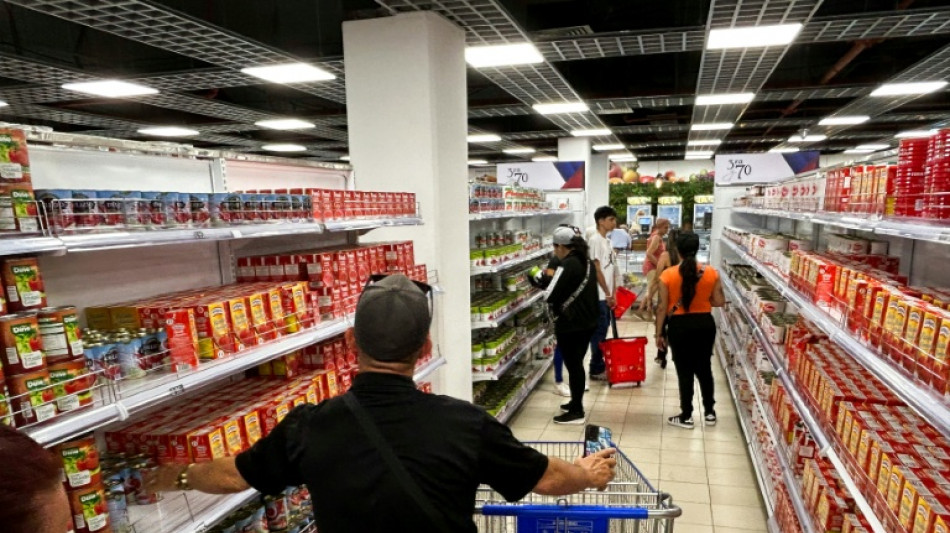
-
 Lewandowski injury confirmed in blow to Barca quadruple bid
Lewandowski injury confirmed in blow to Barca quadruple bid
-
Russia and Ukraine accuse each other of breaching Easter truce

-
 Zimbabwe bowl Bangladesh out for 191 in first Test in Sylhet
Zimbabwe bowl Bangladesh out for 191 in first Test in Sylhet
-
Ukrainians voice scepticism on Easter truce

-
 Pope wishes 'Happy Easter' to faithful in appearance at St Peter's Square
Pope wishes 'Happy Easter' to faithful in appearance at St Peter's Square
-
Sri Lanka police probe photo of Buddha tooth relic

-
 Home hero Wu wows Shanghai crowds by charging to China Open win
Home hero Wu wows Shanghai crowds by charging to China Open win
-
Less Soviet, more inspiring: Kyrgyzstan seeks new anthem

-
 Defending champion Kyren Wilson crashes out in first round of World Snooker Championship
Defending champion Kyren Wilson crashes out in first round of World Snooker Championship
-
NASA's oldest active astronaut returns to Earth on 70th birthday

-
 Exec linked to Bangkok building collapse arrested
Exec linked to Bangkok building collapse arrested
-
Zelensky says Russian attacks ongoing despite Putin's Easter truce

-
 Vaibhav Suryavanshi: the 14-year-old whose IPL dream came true
Vaibhav Suryavanshi: the 14-year-old whose IPL dream came true
-
Six drowning deaths as huge waves hit Australian coast

-
 Ukrainian soldiers' lovers kept waiting as war drags on
Ukrainian soldiers' lovers kept waiting as war drags on
-
T'Wolves dominate Lakers, Nuggets edge Clippers as NBA playoffs start

-
 Taxes on super rich and tech giants stall under Trump
Taxes on super rich and tech giants stall under Trump
-
Star Wars series 'Andor' back for final season

-
 Neighbours improvise first aid for wounded in besieged Sudan city
Neighbours improvise first aid for wounded in besieged Sudan city
-
Tariffs could lift Boeing and Airbus plane prices even higher

-
 Analysts warn US could be handing chip market to China
Analysts warn US could be handing chip market to China
-
Unbeaten Miami edge Columbus in front of big MLS crowd in Cleveland

-
 Social media helps fuel growing 'sex tourism' in Japan
Social media helps fuel growing 'sex tourism' in Japan
-
'Pandora's box': alarm bells in Indonesia over rising military role

-
 Alaalatoa hails 'hustling hard' Brumbies for rare Super Rugby clean sheet
Alaalatoa hails 'hustling hard' Brumbies for rare Super Rugby clean sheet
-
Trio share lead at tight LA Championship

-
 Sampdoria fighting relegation disaster as old heroes ride into town
Sampdoria fighting relegation disaster as old heroes ride into town
-
Recovering pope expected to delight crowds at Easter Sunday mass

-
 Nuggets edge Clippers in NBA playoff overtime thriller, Knicks and Pacers win
Nuggets edge Clippers in NBA playoff overtime thriller, Knicks and Pacers win
-
Force skipper clueless about extra-time rules in pulsating Super Rugby draw

-
 DEA MARIJUANA SCAM: As DEA Cannabis Program Implodes This 4/20, MMJ Stands Alone in Pursuit of Real Medicine
DEA MARIJUANA SCAM: As DEA Cannabis Program Implodes This 4/20, MMJ Stands Alone in Pursuit of Real Medicine
-
Nuggets edge Clippers in NBA playoff overtime thriller, Pacers thump Bucks

-
 Unbeaten Miami edge Columbus in front of big crowd in Cleveland
Unbeaten Miami edge Columbus in front of big crowd in Cleveland
-
Kim takes one-shot lead over Thomas, Novak at RBC Heritage

-
 Another round of anti-Trump protests hits US cities
Another round of anti-Trump protests hits US cities
-
'So grateful' - Dodgers star Ohtani and wife welcome first child

-
 PSG maintain unbeaten Ligue 1 record, Marseille back up to second
PSG maintain unbeaten Ligue 1 record, Marseille back up to second
-
US, Iran report progress in nuclear talks, will meet again

-
 US Supreme Court intervenes to block Trump deportations
US Supreme Court intervenes to block Trump deportations
-
Hamas armed wing says fate of US-Israeli captive unknown

-
 Pacers thump Bucks to open NBA playoffs
Pacers thump Bucks to open NBA playoffs
-
Sabalenka reaches Stuttgart semis as Ostapenko extends Swiatek mastery

-
 Zelensky says Ukraine will observe Putin's Easter truce but claims violations
Zelensky says Ukraine will observe Putin's Easter truce but claims violations
-
'Fuming' Watkins fires Villa in bid to prove Emery wrong

-
 DR Congo boat fire toll revised down to 33
DR Congo boat fire toll revised down to 33
-
England thrash Scotland to set up France Grand Slam showdown

-
 Verstappen's Red Bull 'comes alive' to claim record pole in Jeddah
Verstappen's Red Bull 'comes alive' to claim record pole in Jeddah
-
McTominay fires Napoli level with Inter as Conte fuels exit rumours

-
 Rajasthan unleash Suryavanshi, 14, as youngest IPL player but lose thriller
Rajasthan unleash Suryavanshi, 14, as youngest IPL player but lose thriller
-
Man City boost top five bid, Aston Villa thrash in-form Newcastle


Cuba resurrects dollar-only stores, a symbol of inequality
In communist Cuba, some customers are more equal than others, as a 40-year-old math teacher who was out shopping recently in Havana with his son discovered.
The pair passed a spanking new shop situated on the ground floor of a luxury hotel in the upmarket Miramar neighborhood.
But "we had barely put a foot inside when they told me it (payment) was in dollars," Michael, the teacher, who declined to give his surname, told AFP.
"Let's go, this isn't for us," he told his son, making a beeline for the door.
The state-owned supermarket, which opened in January, is the first of several dollar-denominated stores set to open across the island, as part of a bid to boost the island's battered economy.
Prime Minister Manuel Marrero said the move was a "necessary process" for the state to get its hands on some of the dollars circulating "illegally" on the black market.
The Caribbean nation of 9.7 million is experiencing its worst economic crisis in 30 years, marked by shortages of food and fuel, recurring blackouts and a critical shortage of hard currency.
Remittances from Cuban migrants are the island's second-biggest source of precious dollars, after the payments it receives from loaning tens of thousands of doctors to around 60 countries, including Venezuela and Brazil.
But many Cubans have no access to greenbacks. That leaves the country divided between the haves, who can purchase plentiful goods in dollar-payment stores, and the have-nots like Michael, who is paid in Cuban pesos -- which he then converts into MLC, a virtual currency introduced in 2019 that has lost much of its value.
- 'The prince and the pauper' -
As Michael was leaving the dollar-denominated store, customers were emerging with trolleys piled high with goods -- a rare sight of plenty in Cuba, where store shelves are often empty.
The shortages, coupled with paltry wages (the average monthly salary is around 5,000 pesos, or $42), mean that people can rarely manage to fill their carts.
"Here we've always found what we're looking for," said Enzo Puebla, a 24-year-old engineer. He receives dollars from relatives overseas, using them to buy eggs, cooking oil and meat -- goods rarely stocked in the MLC-payment store across the street.
Such is the contrast between the two stores that Cubans have nicknamed them "the prince and the pauper."
"The main problem of dollarization is that it's partial," Cuban economist Mauricio de Miranda told AFP, noting that while consumer goods may be available in dollars, salaries are not.
"This naturally leads to the exclusion of people who have no way of obtaining dollars," Miranda, a researcher at Javierana University in the Colombian city of Cali, said.
- When dollars meant jail -
Cuba has a long, turbulent relationship with the dollar.
After the nationalist revolution that brought Fidel Castro to power in 1959, the dollar was strictly banned.
Being in possession of a single greenback could land a person in prison for a year.
It took the collapse of the Soviet Union, Cuba's main ally and financial backer, to bring a change of heart.
In 1993, Castro finally decriminalized possession of dollars, and the first stores accepting greenbacks were opened.
But a decade later, amid a row with the United States, the dollar was scrapped as legal tender.
- Drop in tourism -
Cuba blames its current economic woes on a tightening, during Donald Trump's first presidency, of the six-decade-long US trade embargo.
But it is also reeling from a decline in tourists, who are put off by the widespread shortages and blackouts, and a failed monetary reform in 2021 that drove up the price of dollars on the black market.
The government has billed its partial dollarization strategy as a temporary measure aimed at reviving the economy -- and says its ultimate goal is to wean Cubans off the US currency altogether.
For Tamarys Bahamonde, a Cuban economist at the American University in Washington, it's an illusory goal.
Cuba, she argued, is a "nearly textbook case of the difficulties you face when you try to de-dollarize an economy."
P.Costa--AMWN